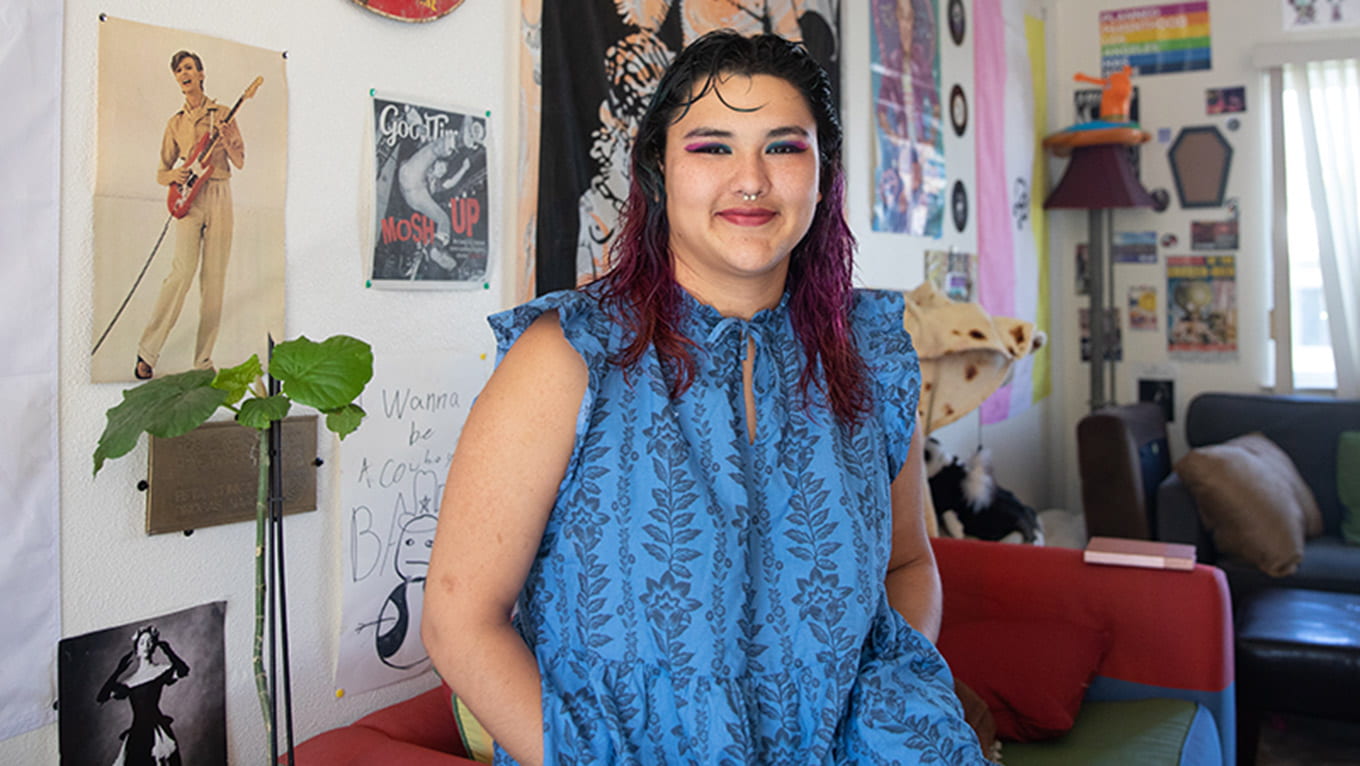As the first MEP Tech4Good Fellow, UC Santa Cruz Baskin School of Engineering student Katia Avila Pinedo is making an impact at the intersection of education and computing.
The inaugural leadership program—spearheaded by Carmen Robinson, director of student excellence, engagement, and inclusion—is a partnership between the MESA Engineering Program (MEP), an academic enrichment program serving first-generation and historically underrepresented students, and the UCSC Tech4Good Lab, a social computing research lab led by Assistant Professor of Computational Media David Lee that develops systems for social good. MEP Tech4Good Fellows receive a quarter-long, full-time, paid internship and serve two quarters as a paid team lead.
“The goal of the program is to enable students from low-income or underrepresented backgrounds to take on deeper roles as leaders and researchers within Tech4Good without needing to work to support themselves, which often prevents students from being able to take on these more time-intensive roles” Lee said.
Avila Pinedo was selected for her previous work done in the Tech4Good Lab, her commitment to supporting her fellow MEP members and UCSC students, and her interest in web development, computing, and education.
“I’m very excited to have been chosen as the first MEP Tech4Good Fellow,” Avila Pinedo said. “I’m inspired by what the different organizations, academic support programs, and labs do here at Baskin Engineering. You can always find a supportive space to help you along your journey. The experiences I’ve had to aid in my student success journey empowers me to find ways to pay it back and make a positive difference in the STEM community.”
Leading socially impactful research
Avila Pinedo, who is a fourth-year computer engineering student and MEP member, will spend the 2022–23 academic year leading research teams in the Tech4Good Lab and carrying out a year-long social impact project, one of the requirements of the Chancellor’s Undergraduate Internship Program (CUIP), which is partially funding the new program.
Currently, Avila Pinedo is a member of two Tech4Good research teams. One of the teams, spearheaded by Ph.D. student Dustin Palea, is developing a scheduling platform called Timely to support group consensus and collaboration through the use of artificial intelligence. As part of her role on the team, Avila Pinedo is helping write the research paper, which the group hopes to publish by the end of the academic year.
She is also a member of the Tech4Good development team, where her software development skills are helping to build Anota, a platform to streamline collaboration for student-conducted interviews performed in the research collection process in Lee’s classes.
Community engagement
With support from MEP, the Tech4Good Lab, and CUIP, Avila Pinedo will design, develop, and execute a community-focused project over the course of the year.
During her recent experience as a CalTeach intern in a Gonzales, California middle school math class, she observed that many middle schoolers had an interest in computer science but no access to pursue those interests through extracurricular computer science education and activities.
Drawing from her summer internship experience, she wants her year-long project to focus on bridging the gap between students who are interested in pursuing STEM and making computer science education and engineering accessible to all.
“There is a lack of exposure to not just social computing, but design, development, and research for middle school students,” Avila Pinedo said. “I’d like to find a way to combine my passion for education and skills in social computing and make the biggest positive impact possible in this space.”
Although she’s still in the early stages of project development, Avila Pinedo is brainstorming ways that she could collaborate with Gonzales Unified School District to have middle school students come to the UC Santa Cruz campus and tour the Tech4Good Lab. She wants to show the students what the lab has to offer, what social computing is all about, and what research and job opportunities are available in this industry, encouraging more students to pursue STEM.
“There are many people who have technical and intellectual strength, but fewer who are also great team members, mentors, and leaders,” Lee said. “Katia was someone for whom this was true early on with her previous work with the Tech4Good Lab.”
Recently, Lee and Robinson have identified their second MEP Tech4Good fellow, Jackson Tran, a computer science student at the Baskin School of Engineering. Tran will start his full-time research internship spring 2023. His project centers around designing a survey app that enhances one’s ability to understand the needs of learners and communities.
– SHARE THIS STORY –
You May Also Be Interested In
-

2025 Dean’s Awards highlight outstanding Baskin Engineering undergraduate research in AI, cybersecurity, biomedicine, and more
-

Baskin Engineering students sweep SC Launchpad 2025 awards in technology and social impact categories
-

First annual UC Open Summit highlights open source innovation in the UC system

